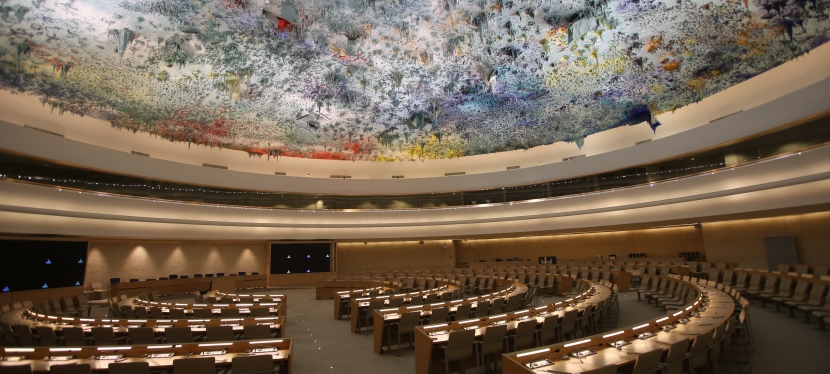By Frank Sherman
The ICCR Climate Change Workgroup met in mid-June, hosted by the Nathan Cummings Foundation, an ICCR member in NYC, to evaluate the progress over the past year and chart out a path forward for the 2018-19 corporate engagement season. We took time to reflect on the social and faith trends; review the political and economic landscape; and map the growing investor actions on climate. We then evaluated our progress over the past couple years before developing a SWOT analysis, mission and vision. In the afternoon, we discussed the path forward by re-directing the existing programs and discussing some new areas to pursue.
Jake Barnett (Morgan Stanley Graystone), together with Mary Beth Gallagher (Tri-State CRI), presented the climate justice perspective by describing the disproportionate adverse impacts climate change has on vulnerable communities. These include decreased agricultural production due to drought resulting in increased migration, disproportionate impacts on women, increased disease burdens due to intensified heat and insect-borne diseases, and displacement from intensified storms due to lack of resilience (e.g. Hurricane Harvey and Maria). In addition, roughly 1.1 billion people lack access to electricity, making the provision of clean, affordable energy essential for communities trying to escape poverty. Unlike secular asset managers, the faith community can elevate climate change from a partisan political discourse to a moral issue that we are all called to address. We need to be bold and exhibit urgency by leveraging partner organizations (Human Rights Watch, Earth Justice, Sierra Club, etc.), and put a human face on the climate change impacts.
Aaron Ziulkowski (Walden Asset) provided the political and economic overview noting that, despite growing awareness, global GHG emissions continue to rise, although they have leveled off in OECD (developed) countries. The national commitments made in Paris fall short of the 2 degree scenario and get the world nowhere near the 1.5 degree ambition. Transportation has replaced electricity production as the top emitter in the U.S. due to the displacement of coal by natural gas. Despite the White House announced withdraw from Paris, several states have set targets for GHG reduction, renewable energy and CAFÉ standards (which reduce auto emissions) that exceed federal standards. Japan, the EU, China and India continue to increase CAFÉ standards while Trump’s EPA rolls back U.S. targets. The EPA is being sued for rolling back methane emissions standards in oil & gas production. Economists are confident that economics wins over politics with the cost of unsubsidized wind and solar electrical power now competitive with fossil fuels. We agreed to step up public advocacy and pressure corporations to do the same if the U.S. wants to remain competitive in a low carbon world.
Jamie Bonham (NEI) mapped the growing awareness and complexity of various investor groups to manage climate risks and opportunities. ICCR has to find its unique voice while leveraging these larger asset managers and NGO’s. Sean Wright of EDF presented some ideas for continued engagement on methane engagements (“The ICCR methane campaign is making a critical difference”). Rob Berridge of Ceres discussed the overlap of the Climate Action 100+ (CA100) with existing ICCR engagements with 40 U.S. companies. He has been identified as the Ceres contact with ICCR on the CA 100+, and will encourage CA100 teams to include ICCR members in their engagements or at least keep us connected (note that SGI members are on the CA100 teams for Exxon, Chevron and Valero). Ceres will analyze the Fortune 500 companies to identify climate laggards that have slipped through the cracks for ICCR to consider engaging.
In assessing ICCR’s progress over the past couple years, we noted advances with heavy GHG emitters by asking for long-term 2-degree scenario plans and science-based reduction targets (SBT). We’ve made more progress with utilities than the transport sectors, while O&G companies continue to hold on to their business-as-usual model, although they too, are starting to develop 2degree scenario reports. ICCR also led the methane campaign with good results (…as attested by EDF) due to our trusted corporate relationships, convening power with companies and non-ICCR investors, and ability to bring NGO expertise and investor focus. Finally, ICCR members were ahead of the investor world engaging global banks and asking for climate related disclosure consistent with TCFD guidelines.
In reviewing ICCR’s capabilities, we felt our strengths included our reputation for long-term, respectful yet challenging engagements; our moral credibility to speak for people and planet; and collaborative culture between members and partners. However, we recognize that often times we lack focus and are spread too thin; we’re not as diverse as desired, in terms of race, faith traditions, and younger generations; and we’re sometimes not clear or consistent in our objectives (“asks”). Opportunities include focusing on climate justice; engaging mid-cap companies: regional companies in communities where we have a presence (CRI’s); diversifying our membership with millennials and other faiths; and better collaboration with partners (e.g. Ceres). In addition to the current political environment, we recognize threats to our dated model such as aging/consolidation of faith members; corporate opposition to shareholder rights; and overlap with some of our partners.
We developed a draft Mission statement: “Through the lens of faith and as stewards of creation, we engage companies as investors and participate in public advocacy to accelerate the just transition to a low carbon economy consistent with the Paris Climate Accord and in preference to those most vulnerable.” We then brainstormed a Vision or what success looks like in terms of the companies we engage, the communities for which we advocate, the environment and society. Out of this came the realization that ICCR needs to stay above political partisanship while having the audacity to (continue to) speak truth to power; be pioneers in addressing emerging, cross-cutting issues; and be true to our justice mission.
Going forward, we will continue the SBT engagements by collaborating with CA100, expanding the energy utility list, adding the Fortune 500 laggards, and identifying mid-cap/small-cap companies in communities where we have members. Engagement of local companies has the potential added benefit of encouraging support for pro-climate policies more broadly. We will shift our conversation from 2 degrees (where too many people will suffer) to 1.5 degree scenarios and will seat our climate change work within a frame of “Just Transition”. Just Transition focuses on the needs of workers and communities as the energy economy transitions away from a reliance on fossil fuels. We plan to expand the methane campaign by challenging the ‘clean natural gas’ mantra – working more closely with affected communities, engaging companies across the value chain, and bringing larger asset managers to the discussion. We will establish an Amazon team where we hope coordination among investors and collaboration with select NGOs will achieve better results than the individual efforts to date. This big tent effort with Amazon will address issues across program areas, including climate change. Finally, we will broaden the effort to engage the financial sector, focusing on regional banks.
We concluded with agreement that the growing investor attention towards climate change is a welcome development that is especially needed in the current political environment. ICCR needs to stay true to its mission and focus on those activities that incorporate marginalized communities and their needs into the vision that guides our corporate engagements.








